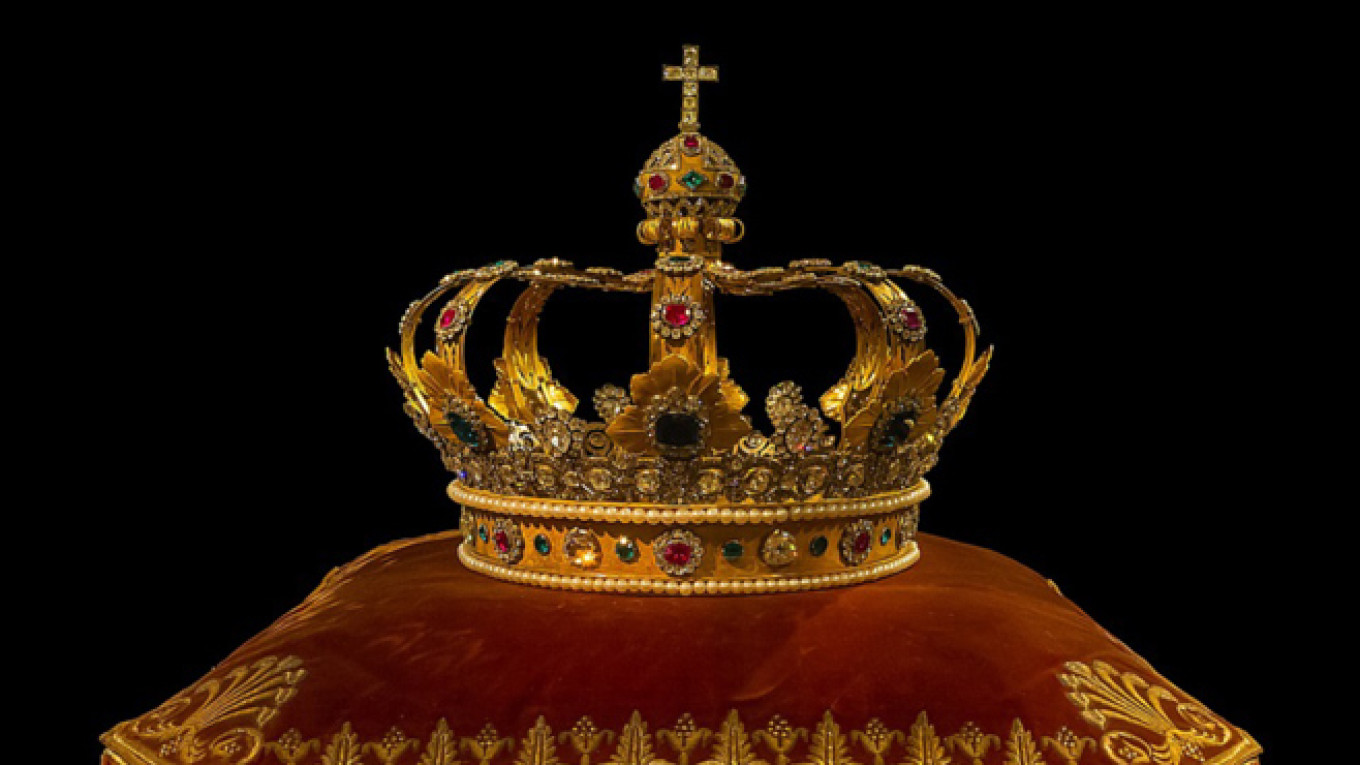
?????€ó?????‹??: trademark
I am going to close my mind to the horrors of the past few days — and my increasing desperation about the world — and cast my gaze on the far more benign sphere of Russian adjectives. Because adjectives are good. They show how you feel about things, and can be used on social media to make clear what you think about that stupid, ignorant, bigoted…
Sorry. You get the idea. The world revolves around well-chosen adjectives.
The tricky part in Russian is to choose well. You need to know which adjective goes with which noun. And it helps to pronounce them right. For example, I like the adjective ?????€???????‹?? (crown or crowning) a word that I mix up with ?????€?µ???????? (root, native) by getting the stress wrong. Humiliating.? ?????€???????‹?? (stress on middle syllable) is from the word ?????€?????° (crown). ?????€?µ???????? (stress on last syllable) is from the word ?????€?µ???? (root). People don't put roots on their head.
?????€???????‹?? is not used much today in the sense of "pertaining to the crown," except when translating British legal documents. But when referring to Russian judges in the past, it was used to make a distinction between non-governmental juries and the governmentally employed guys on the bench: ?????‚?? ???€???????¶???‹?µ ?·?°???µ???°?‚?µ?»?? ?€?µ???°?»?? ???‚?€???µ ?±???»?????µ ???µ?», ?‡?µ?? ?????€???????‹?µ ??????????, ?????? ???°?»?? ?????‚?????°?»?? ???????»?µ???????? ?? ???????‚?????????‚???µ ???·???»???????? ???° ?‚?µ ???»?? ?????‹?µ ???€?µ???‚?????»?µ?????? (Although jury members decided twice as many cases than the judges, they weren't much different than judges in their rigid attitudes about certain crimes.)
Most of the time ?????€???????‹?? is used to mean "crowning" in the figurative sense: someone's best, most recognizable, and most renowned skill. You hear it in the theater: ??‚?? ?±?‹?»?° ?µ???? ?????€???????°?? ?€???»?? (That was his star turn.) Or in restaurants: ?•?‘ ?????€???????‹?? ?±?»???????? ?????»???µ?‚???? ???»?µ???????° (Her signature dish is venison.) Or in the circus: ???°?¶???‹?? ?€?°?· ???‚???‚ ?????€???????‹?? ???????µ?€ ?????µ???? ?????????€?° ?????‚?€?????°?» ???°?? ?????µ?… ?·?€???‚?µ?»?µ?? (Every time my idol performed, his trademark act thrilled all of us in the audience.) Or on the sports field: ?????€???????°?? ???????‚?°???†???? ?®?€???? ?‘???€?·?°???????????????? — 800 ???µ?‚?€???? (Yury Borzakovsky's best event is the 800-meter race.)
Another word for this is ?„???€???µ?????‹?? (brand-name), which can be used almost in the same way as ?????€???????‹??, except it refers to a company rather than a monarchy. So ?„???€???µ?????‹?? ???°???°?·???? is a company store: ?????»?»?µ???†???? ???€?µ?????‚?°???»?µ???° ?? ?„???€???µ???????? ?±???‚?????µ (The collection is sold in brand boutiques.) But more often ?„???€???µ?????‹?? means a trademark in the broadest sense: ?“?»?°?????°?? ?„???€???µ?????°?? ?‡?µ?€?‚?° ?¶???€???°?»?° ???€???„?µ???????????°?»?????°??, ?…?»?°?????????€???????°?? ???€???‚?????° (The hallmark of the magazine is its professional, unbiased criticism.) But note: You can't really say ?„???€???µ?????°?? ?€???»??.
All of these trademark behaviors can also be ???????????‚???µ?????‹?µ (typical, intrinsic), from ???????? (one's own). ?•???? ???????????‚???µ?????‹ ???±?‰???‚?µ?»?????????‚??, ?±?‹???‚?€???‚?° ?? ?????µ?€?°?‚???????????‚?? ?? ?€?°?±???‚?µ (He is typically outgoing, quick and efficient at work.) ???? ???????????‚???µ???????? ?µ?? ?°???‚???????????‚???? ?????° ?????‚?€?????»?° ?????±?€?°?????µ (She set up the meeting with her usual energy.)
Or they can be ???µ???·???µ?????‹?? (unchanging). ???? ?????µ?????° ???‹???‚?????°?» ???? ?????????? ???µ???·???µ?????‹?? ?????€?‚?„?µ?»?µ?? (He always performed with his trademark briefcase.)
So if you have a great schtick, it's ?„???€???µ?????‹?? or ?????€???????‹??. If you always behave a certain way, it's ???????????‚???µ?????‹??. And if you're sure you won't change, you're ???µ???·???µ?????‹??.
Go on, don't be shy — this is your crowning moment.?
Michele A. Berdy, a Moscow-based translator and interpreter, is author of "The Russian Word's Worth" (Glas), a collection of her columns.
A Message from The Moscow Times:
Dear readers,
We are facing unprecedented challenges. Russia's Prosecutor General's Office has designated The Moscow Times as an "undesirable" organization, criminalizing our work and putting our staff at risk of prosecution. This follows our earlier unjust labeling as a "foreign agent."
These actions are direct attempts to silence independent journalism in Russia. The authorities claim our work "discredits the decisions of the Russian leadership." We see things differently: we strive to provide accurate, unbiased reporting on Russia.
We, the journalists of The Moscow Times, refuse to be silenced. But to continue our work, we need your help.
Your support, no matter how small, makes a world of difference. If you can, please support us monthly starting from just $2. It's quick to set up, and every contribution makes a significant impact.
By supporting The Moscow Times, you're defending open, independent journalism in the face of repression. Thank you for standing with us.
Remind me later.


